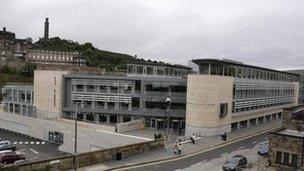Job share to run Edinburgh City Council
- Published

Labour and the SNP will be sharing power in the capital
And so Labour and the SNP are to share power in the capital.
As an onlooker and occasional resident, I would simply wish them loadsaluck, especially with the trams.
The Labour group leader, Andrew Burns, says that the two parties have been given a "very clear mandate" by the citizens of Auld Reekie.
I hate to disagree with Councillor Burns, who is an amiable fellow, but that does not strike me as an accurate assessment.
Indeed, one might argue exactly the opposite.
Consider this.
Labour and the SNP did not run as a joint ticket in Edinburgh. They did not say to the voters that, if elected, they would form a coalition. They had no recent history in the capital of forming such a coalition.
In fact, they ran their campaigns in firm contradistinction to each other. Labour condemned the SNP and vice versa.
If the voters took them at their words, it is reasonable to presume that there are people who opted for Labour in Edinburgh at least partly in an effort to oust the incumbent SNP.
Further, it is reasonable to presume that there are people who voted SNP at least partly out of dislike of Labour.
In the event, neither party gained a mandate from the electorate. Hence coalition talks. Which produced a joint group with sufficient strength to win votes in the council chamber.
That is a feasible coalition, it is a credible local power base, it is a post-election compromise.
It may well be entirely sensible. It is not, however, an arrangement driven by an explicit popular mandate.
There is a further element to consider.
The SNP group leader, Steve Cardownie, noted his party and Labour had economic policies which were "almost one and the same."
As a former Labour stalwart, Mr Cardownie might be supposed to be in a position to know - but I think this reflects two further factors in contemporary politics.
One is the elision of differences generally between the major parties.
To some extent, that is an historic tendency. To some degree, it is driven by the financial circumstances of Scotland and the wider UK which restrict the scope for ambitious promises.
But the second point is the relative lack of clout which resides with local government.
The decisions to be taken do not generally lend themselves to acutely ideological or philosophical solutions.
That is not to say that they are not important or political. The key function - almost the sole true function - of councils is planning.
Parties and personalities
Almost everything else is to some extent ephemeral or shared.
Planning really matters - and it can be driven by an overall political outlook. Does a party favour more housing? More industrial zones? More roads? Green belt protection?
And so, if Labour and the SNP can agree on Edinburgh's future general direction, there is no reason whatsoever why they might not form a stable coalition to exercise local powers.
At the Scottish national level, such a coalition is inconceivable - not because of the intrinsic nature of the parties or the personalities but because the issues to be determined include the fundamental question of independence and Scotland's constitutional future which no amount of inter-party negotiation can elide.
To all of Scotland's elected councillors, warm congratulations and my very best wishes. Serve well.
PS: While I am in a congratulatory mood, it would be remiss not to thrust umpteen plaudits in the direction of the mighty Dundee United.
Not only did we beat Celtic but we qualified for Europe. Superb. To those who are considering leaving, is it perhaps time to think again? Europe beckons.